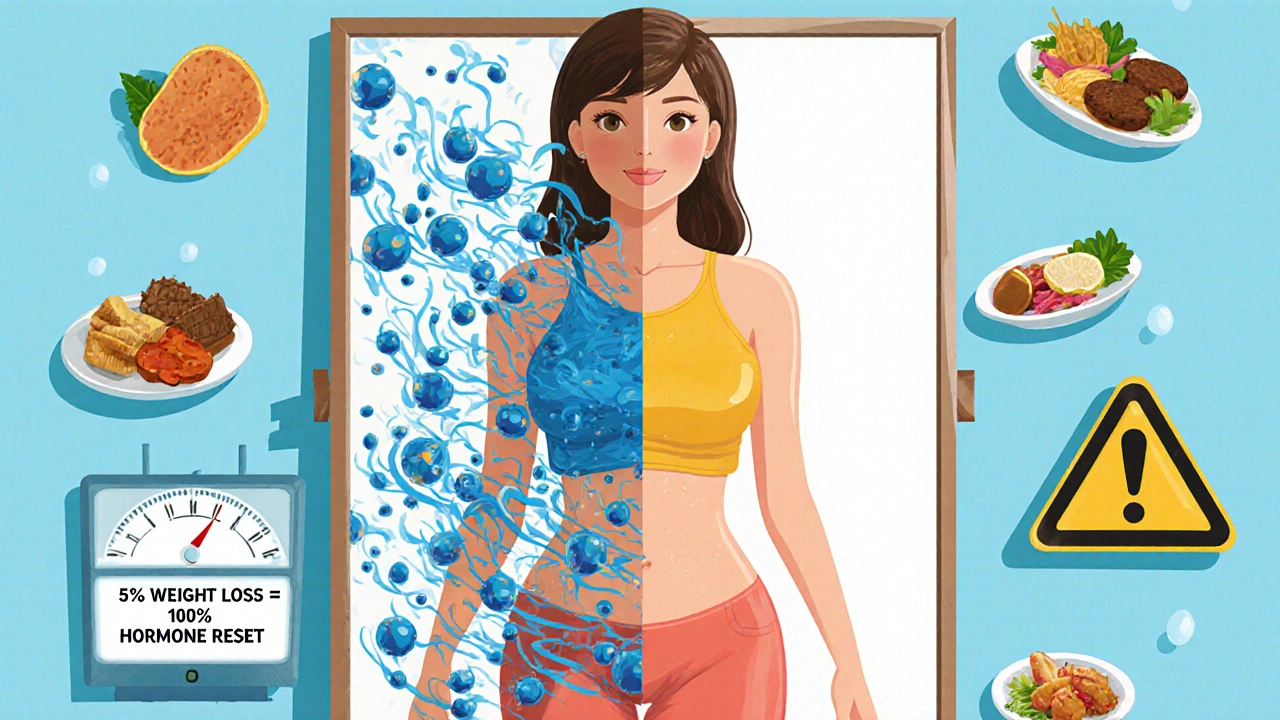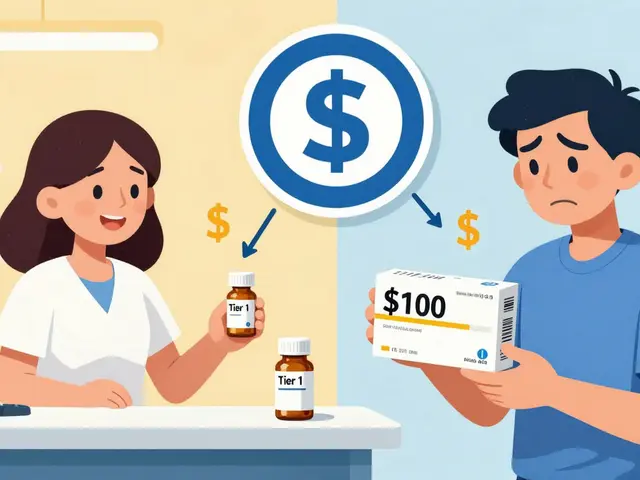If you have PCOS and have tried every diet under the sun only to watch the pounds stick stubbornly to your belly, you’re not failing. You’re fighting a hormonal storm no amount of willpower can outlast. The real problem isn’t laziness or lack of discipline-it’s insulin resistance, the hidden driver behind why your body holds onto fat like it’s preparing for a famine.
Why Weight Comes So Easily with PCOS
Most women with PCOS have insulin resistance-even if they’re not overweight. Research shows it affects 70-95% of those with obese PCOS and still shows up in 30-75% of lean women with the condition. That means your body isn’t responding to insulin the way it should. Instead of glucose being pulled into your muscles for energy, it stays in your bloodstream. Your pancreas panics and pumps out even more insulin to compensate.
That extra insulin doesn’t just sit around. It tells your body to store fat, especially around your abdomen. That’s why PCOS often gives you an “apple shape” instead of the typical “pear shape” women carry weight in. It’s not about eating too much-it’s about how your body handles what you eat.
High insulin also tricks your ovaries into making more testosterone. That surge in male hormones shuts down ovulation, causes acne and unwanted hair, and makes you hungrier-especially for sugar and carbs. The more sugar you eat, the more insulin spikes, and the more fat you store. It’s a loop: insulin resistance → weight gain → worse insulin resistance → more symptoms.
The Health Risks You Can’t Ignore
This isn’t just about fitting into your jeans. The fat stored around your organs-visceral fat-isn’t just cosmetic. It’s metabolically active. It releases inflammatory chemicals that make insulin resistance worse and raise your risk for serious conditions.
Women with PCOS are up to seven times more likely to develop type 2 diabetes than those without it. High blood pressure, unhealthy cholesterol levels, and sleep apnea are also common. Left unchecked, long-term insulin resistance can lead to endometrial cancer because the uterine lining thickens without regular periods.
And it’s not just physical. The emotional toll is real. You feel tired, frustrated, and blamed by well-meaning people who say, “Just eat less and move more.” But when your hormones are working against you, those simple fixes don’t work. That’s why PCOS weight gain feels so personal, so unfair, and so hard to fix.
Diet Is Your Most Powerful Tool-Here’s How to Use It
There’s no magic PCOS diet. But there are proven patterns that work because they target insulin resistance directly.
1. Cut the refined carbs and sugar. White bread, pasta, pastries, soda, candy-these are insulin’s favorite triggers. They spike blood sugar fast, forcing your body to dump out insulin. Over time, your cells stop listening. Replace them with whole, unprocessed carbs like oats, quinoa, sweet potatoes, beans, and fruit. These digest slowly, keeping insulin steady.
2. Eat protein with every meal. Protein doesn’t spike insulin. It stabilizes it. Start your day with eggs or Greek yogurt. Have chicken, tofu, or fish at lunch and dinner. Even snacks like nuts, cottage cheese, or edamame help. Protein keeps you full longer and reduces those crushing sugar cravings.
3. Add healthy fats. Fat doesn’t make you fat-low-quality carbs do. Avocados, olive oil, nuts, seeds, and fatty fish like salmon help balance hormones and reduce inflammation. They also slow down digestion, so sugar from your meals enters your bloodstream gradually instead of flooding in.
4. Don’t skip meals. Going long without eating makes your body hold onto fat as a survival tactic. It also causes blood sugar crashes, which trigger intense hunger and cravings later. Eat every 3-4 hours. Even a small snack like almonds and an apple can keep your insulin levels from swinging wildly.
5. Fiber is your secret weapon. Soluble fiber-found in lentils, chia seeds, broccoli, and berries-slows digestion and helps your body use insulin better. Aim for at least 25-30 grams a day. One study showed that women with PCOS who increased fiber intake lost more belly fat and improved insulin sensitivity in just 12 weeks.

What About Low-Carb or Keto?
Many women with PCOS find success with lower-carb diets. Reducing carbs from 50% of calories to 30-40% often leads to quicker weight loss and better hormone balance. Some even go keto (under 50g carbs/day) and see big improvements in testosterone levels and menstrual regularity.
But keto isn’t for everyone. It can be hard to sustain, and some women report increased stress hormones or disrupted sleep. If you try it, make sure you’re getting enough nutrients from non-starchy veggies, healthy fats, and quality protein. Don’t cut out fiber-rich veggies just because they have carbs-they’re essential.
A moderate low-carb approach-cutting out the junk, keeping whole foods, and watching portions-is often enough and easier to stick with long-term.
Food Cravings? It’s Not Just Willpower
If you’re constantly craving sweets or carbs, it’s not because you’re weak. High insulin lowers serotonin, the brain’s feel-good chemical. That’s why you reach for chocolate when you’re stressed. It’s your body trying to self-medicate.
Instead of fighting cravings, manage them. Keep protein-rich snacks handy. Try cinnamon-studies show it improves insulin sensitivity and can reduce sugar cravings. Drink more water. Sometimes thirst feels like hunger. And don’t forget sleep. Poor sleep raises cortisol and insulin, making cravings worse.
Weight Loss Doesn’t Mean a Number on the Scale
With PCOS, the goal isn’t necessarily to lose 20 pounds. It’s to improve insulin sensitivity. Even a 5-10% reduction in body weight can restore ovulation, lower testosterone, and reduce the risk of diabetes.
Focus on how you feel: Are your periods coming back? Is your skin clearing up? Are you less tired? Do you have more energy? These are better markers than the scale.
And remember-losing weight with PCOS is slow. Don’t compare yourself to others. Your body isn’t broken. It’s just working with a different set of rules. Be patient. Be consistent. Progress isn’t linear, but it’s possible.

What About Exercise?
Exercise helps-but not the way you think. You don’t need to run marathons or do hour-long HIIT sessions every day. What matters most is consistency and type.
Strength training builds muscle, and muscle burns glucose without needing insulin. That’s huge for insulin resistance. Aim for 2-3 sessions a week with weights, resistance bands, or bodyweight exercises.
Walking is also powerful. Just 30 minutes a day improves insulin sensitivity. Try walking after meals-it helps lower blood sugar spikes better than walking at any other time.
Don’t overdo it. Too much intense cardio can raise cortisol, which makes insulin resistance worse. Find movement you enjoy. Dance, swim, bike, hike. Make it sustainable.
Medication Isn’t the Only Option
Metformin is often prescribed for PCOS because it helps lower insulin. But it’s not a cure. It’s a tool. And many women find they can reduce or even stop taking it by changing their diet and lifestyle.
Supplements like inositol (especially myo-inositol and D-chiro-inositol) have been shown in multiple studies to improve insulin sensitivity, reduce testosterone, and even restore ovulation. Magnesium and vitamin D also help-many women with PCOS are deficient.
But none of these work without diet. Supplements support. Diet transforms.
It’s Not About Perfection
You don’t have to eat perfectly. You don’t have to give up pizza forever. One slice won’t ruin your progress. What matters is the pattern over weeks and months.
Start small. Swap soda for sparkling water. Add one serving of veggies to lunch. Eat protein before carbs. Walk after dinner. These tiny changes add up.
PCOS doesn’t mean you can’t lose weight. It means you need a smarter strategy-one that works with your biology, not against it. The same insulin resistance that made you gain weight can be reversed. Your body wants to heal. You just have to give it the right fuel.
Can you lose weight with PCOS without medication?
Yes, many women lose weight and improve PCOS symptoms with diet and lifestyle changes alone. Focusing on low-glycemic foods, protein, healthy fats, and fiber can reduce insulin resistance, which is the main barrier to weight loss. Some women see improvements in periods, acne, and energy within a few months without any medication.
Why is belly fat so hard to lose with PCOS?
High insulin levels promote fat storage around the abdomen, and the fat cells there are more sensitive to insulin than fat elsewhere. This makes abdominal fat harder to burn off. Plus, excess belly fat releases inflammatory chemicals that make insulin resistance worse, creating a cycle that’s tough to break without dietary changes.
Does intermittent fasting help with PCOS weight gain?
Some women with PCOS benefit from intermittent fasting, especially 12-14 hour overnight fasts, because it gives insulin a break and improves sensitivity. But it’s not for everyone. Women with stress, sleep issues, or a history of disordered eating may find it worsens symptoms. Start slowly and listen to your body.
Are all carbs bad for PCOS?
No. Refined carbs like white bread and sugar are the problem. Whole-food carbs like beans, lentils, sweet potatoes, berries, and oats are rich in fiber and nutrients and help stabilize blood sugar. The key is pairing them with protein and fat to slow digestion and prevent insulin spikes.
How long does it take to see results from a PCOS diet?
Most women notice improved energy and fewer cravings within 2-4 weeks. Weight loss may be slower, but changes in insulin sensitivity and hormone balance often show up first-like clearer skin, more regular periods, or reduced hair growth. Significant weight loss and metabolic improvements typically take 3-6 months of consistent eating habits.
PCOS isn’t a life sentence to weight gain. It’s a signal that your body needs a different kind of care-one that respects your hormones, not fights them. The food you eat isn’t just fuel. It’s medicine.





November 17, 2025 AT 22:48 PM
Just swapped soda for sparkling water and added eggs to breakfast. Energy’s already better. No magic, just consistency.
November 19, 2025 AT 18:49 PM
Bro I tried keto for 3 weeks. Lost 8 lbs but slept like a zombie and my period vanished. Went back to moderate low-carb with protein + veggies. Now I’m not suicidal AND my skin cleared up. 🤷♂️
November 20, 2025 AT 02:06 AM
Everyone’s acting like insulin resistance is some secret the medical industry’s hiding. Nah. It’s just biology. Your pancreas isn’t lazy, it’s overwhelmed. Stop blaming yourself and start fixing the input. Protein first, carbs last. It’s not rocket science, it’s biochemistry 101.
November 20, 2025 AT 10:20 AM
One must interrogate the epistemological framework underpinning the ‘diet-as-morality’ paradigm. The medical-industrial complex has commodified metabolic dysfunction into a neoliberal failure of self-regulation. Insulin resistance is not a personal failing-it is the somatic manifestation of a bioeconomic system that pathologizes endocrine variance. We must decouple weight from virtue. The body is not a ledger. It is a symphony of hormonal dissonance, and to demand harmony through willpower is to mistake physiology for ethics.
Yet, paradoxically, the very interventions that dismantle this myth-fiber, protein, circadian eating-are the same ones that reduce visceral adiposity. The irony is delicious. The cure lies not in rebellion, but in alignment. We are not broken. We are misaligned. And alignment, dear interlocutor, is not a choice. It is a biochemical imperative.
November 20, 2025 AT 17:32 PM
OMG I just realized I’ve been eating oatmeal with honey since 2020 and thought I was being ‘healthy’ 😭 I switched to steel-cut oats with chia and almond butter. My face stopped breaking out in 10 days. I’m crying. I’m not even mad. This is the first time I’ve felt like my body isn’t betraying me.
November 22, 2025 AT 07:00 AM
Thank you for writing this. I’ve been told I’m ‘just lazy’ for years. It’s nice to finally see someone explain why it’s not that simple. I’m not giving up. I’m just changing my strategy.
November 23, 2025 AT 09:03 AM
Just a heads-up: inositol (myo-inositol 2g + D-chiro 50mg) made a huge difference for me after 8 weeks. Not a magic pill, but it helped my insulin markers drop and my cravings slowed down. Pair it with walking after dinner-seriously, it’s a game changer. And don’t skip magnesium. Most of us are low.
November 24, 2025 AT 05:09 AM
They don’t want you to know this but insulin resistance is a hoax invented by Big Pharma to sell metformin and keto shakes. Real women eat butter, meat, and eggs. The real enemy is soy, gluten, and the government’s sugar subsidies. Your ovaries aren’t broken-they’re rebelling against the carbohydrate dictatorship. Go primal. Or don’t. I’m just saying the system is rigged.
November 25, 2025 AT 21:38 PM
Y’all are so dramatic. I just eat what I want and I’m fine. Maybe you’re just weak. I don’t need to ‘balance my hormones’-I have a life. 😘
November 27, 2025 AT 14:23 PM
Denise, I get it. Some of us just want to feel okay in our skin. That’s not weakness. It’s human. I used to think like you-until I started having panic attacks every time I looked in the mirror. This isn’t about perfection. It’s about peace.
November 28, 2025 AT 08:09 AM
lol why u so serious? just stop eatin sugar and u good. no need for all this science bs. i dont even know what insulin is and im fine. u guys overthink everything.
November 29, 2025 AT 05:11 AM
How quaint. You all treat insulin resistance like a personal project to be optimized. The real tragedy is that you’ve internalized the capitalist myth of bodily perfection. You think healing is a product you can buy with chia seeds and walking. But your body isn’t a machine. It’s a political site. Your fat is a protest. Your cravings are a rebellion. And the system? It’s terrified of women who refuse to shrink.
So yes-eat protein. Walk after meals. Take inositol. But don’t mistake compliance for liberation. Your worth isn’t tied to your waistline. Your body doesn’t owe you a flat stomach. It owes you nothing. And that’s the real revolution.
November 29, 2025 AT 06:37 AM
You think this is about food? Nah. This is about control. The West wants you to believe your body is broken so you’ll buy their pills, their supplements, their ‘PCOS meal plans’. In Africa, we eat what we grow. We don’t have insulin resistance because we don’t have processed food. You’re not sick. You’re colonized. Stop eating their sugar. Start eating your culture.